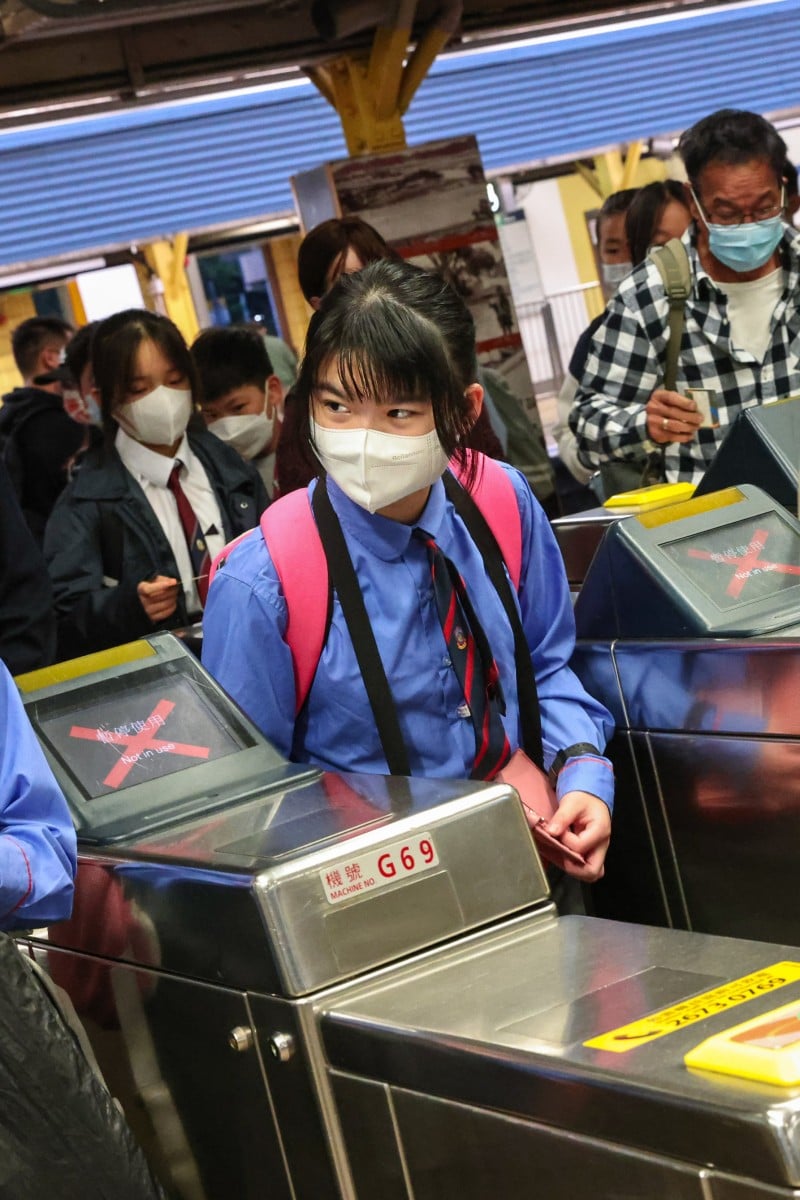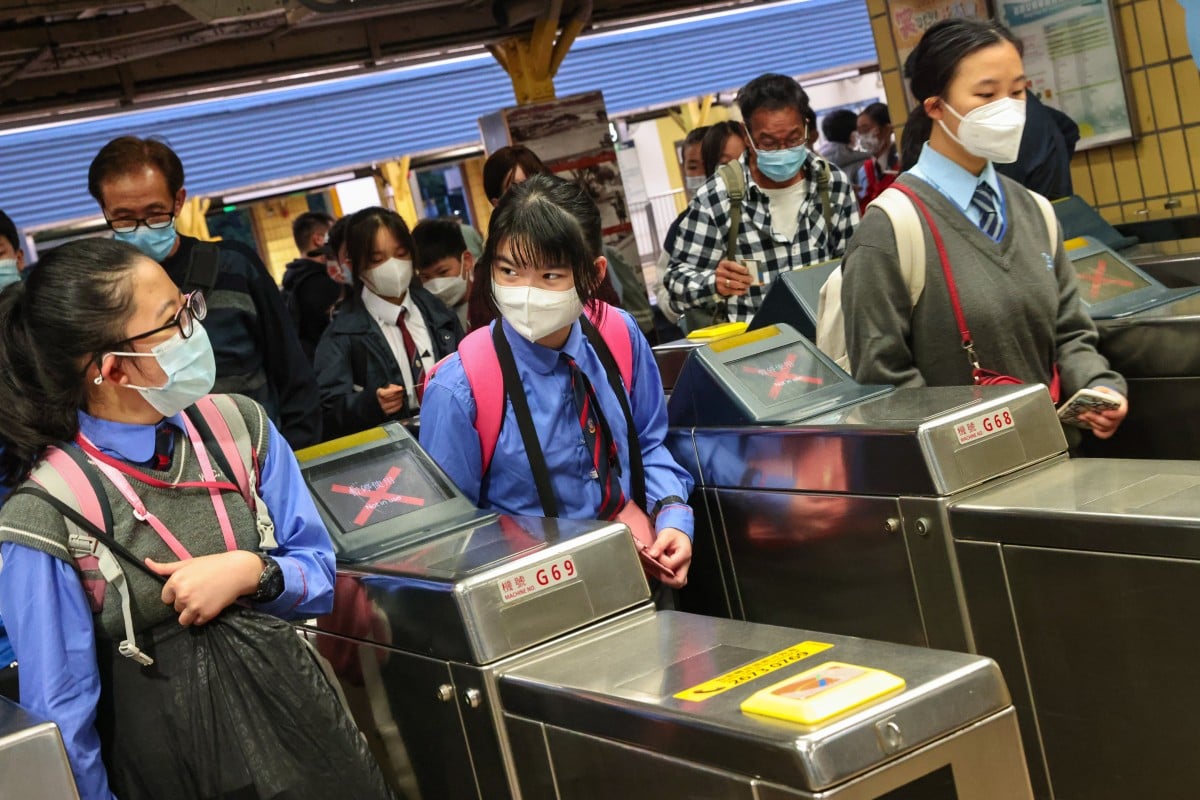
Hong Kong cross-border students discuss hopes and fears amid return to school campuses after 3 years of remote learning
- Three teens who live in mainland China but attend schools in Hong Kong explain how excited they feel to finally have in-person classes again
- Cross-border secondary school pupils now have a designated passageway, exempt from quotas, to enter the city
 Hong Kong currently has almost 21,000 cross-border students, with 7,000 of them in secondary school. Photo: K.Y. Cheng
Hong Kong currently has almost 21,000 cross-border students, with 7,000 of them in secondary school. Photo: K.Y. ChengAt Lo Wu last week, cross-border student Coco Cheung Po-ying was invigorated with a new-found purpose after travelling to Hong Kong to attend in-person classes for the first time in more than three years.
For the 15-year-old, traversing the border felt like switching from one life to another.
“I was immediately struck by the shift from Mandarin to Cantonese, and by the sight of students of different grades and school uniforms. I felt like I immediately became a Hong Kong secondary school student,” said the Form Four student, who is studying at Valtorta College in Tai Po.
As the border between Hong Kong and the mainland fully reopened last Monday, the teen was among the first cross-border pupils to return to school in Hong Kong.
Earlier this month, the city’s government announced that cross-border secondary school students would have a designated passageway to enter Hong Kong from February 8. Currently, there are about 21,000 cross-border students attending schools in the city, and 7,000 of them are at the secondary level.
Cross-border students return to in-person classes in Hong Kong after 3-year hiatus
Coco, who recalled already feeling “thrilled” days before the border reopening, said she woke up at 5.10am to get ready for her commute to Hong Kong last Monday.
The last time she attended in-person classes in Hong Kong was in December 2019.
“The moment I saw the desks and chairs in the classroom, I felt like I was having a dream come true,” said the student, who has been travelling to school on her own since Primary Six.
“I really love being a cross-border student. This identity is very special to me,” she stressed. “Crossing the border year after year allows [us] to have two interchangeable identities ... and witness the transformations between Hong Kong and mainland China up close.”
A void in a student’s life
Mixed in with Coco’s anticipation was also anxiety about whether she would be able to fit in and reconnect with her Hong Kong peers, the student shared.
“I did not make any efforts to build relationships when I was in Form One – which is why I’m a bit at a loss with interpersonal relationships in school,” said the teen, sharing that she had felt lonely because of the social isolation amid the pandemic.
“I feel uneasy seeing familiar faces that have become unfamiliar to me.”
As one of only two cross-border students in her class, Coco has faced tremendous challenges studying remotely for the past three years.
Hong Kong youth with long Covid face challenges returning to school
“Our learning mode changed from ‘listen, speak, write, apply’ to just ‘listen and write’,” the student explained.
“Teachers had to take care of the majority of their students who were in Hong Kong and would forget the minority like us,” she said, acknowledging how difficult it must have been for teachers to give equal attention to pupils in the classroom and those studying remotely.
Once, Coco was late for an online exam because of her poor internet connection. “I lost 20 minutes compared to the other students ... I felt very frustrated,” she recalled, adding that she did not get extra time because it would not be fair to others.
Hong Kong students can finally take their masks off while exercising
But exams and classroom instruction are not the only crucial parts of student life. Coco lamented that without extracurricular activities, her secondary school life did not feel complete.
“Sometimes, I felt jealous that many of my classmates could participate in activities, contests or trips organised by teachers, such as a writing contest or a trip to Disneyland,” she admitted.
“These are destined to be the irrevocable, missing pieces in my school life.”
In three years, some educators have retired or resigned, and Coco said she particularly missed the teachers who taught her English and geography in Form Three. “It was a shame that I could not see the teachers who used to teach me,” she noted.
Adjusting to Covid’s effects on school life
On Monday, the morning assembly at Tai Po Sam Yuk Secondary School in Tai Wo celebrated the return of its cross-border students. The principal introduced them to each teacher and discussed changes at the school.
In the audience was Owen*, a Form Four pupil who travelled to school from Shenzhen via the Lok Ma Chau checkpoint. He was surprised to learn that his science teacher had left the school, amid other adjustments.
“It really is a shame ... and lunch break was shortened from 90 minutes to an hour,” said the 16-year-old. “I wish we could have a longer lunch break so that we would have more time to interact with classmates.”
Another student commuting from Shenzhen to the same school, Tom*, expressed appreciation for how teachers had tried to accommodate the needs of cross-border pupils, who made up more than half of his peers.
“Teachers really cared about us cross-border students and would ... go over concepts we learned previously so that we wouldn’t forget,” said the 16-year-old, who lives next to the Heung Yuen Wai checkpoint and has been crossing the border by himself since Primary Five.
Even so, he only attended in-person classes for one year in his current school as a Form One student, and his academic performance suffered during the pandemic. Thus, he had no choice but to repeat one school year as a Form Four student. However, he was willing to do so to regain his footing in his senior secondary education.
Tom’s mother, Mrs Zuo*, 48, bemoaned: “The students wasted three years of their life learning nothing.”
Hong Kong students’ happiness is dropping, and Covid rules and study stress are to blame
She also noticed that studying remotely had taken a toll on her son’s personal development.
“He changed a lot – he used to be very expressive and would share stories about school when he came home. Now, he barely talks,” said Zuo, who was working as a cleaner and living alone in Yuen Long, apart from her son and husband, during the pandemic.
The mother and son were delighted to reunite as they had not seen each other since 2020.
“It is my hope that the border will never be closed no matter what the future holds,” the mother shared.
Why it’s worth studying in Hong Kong
Despite the obstacles they face, Zuo believes studying in Hong Kong promises a better future for her son. Wanting Tom to eventually work in the city, she said studying in one of Hong Kong’s vocational institutions would be ideal.
In the meantime, she stressed that cross-border pupils needed more support: “[I hope] schools in Hong Kong can provide supplementary classes to help cross-border students to keep up with their studies.”
Coco’s father, a former figure skater in mainland China and now a coach in Hong Kong, believed that studying in this city meant better prospects for his daughter’s career.
“My father has a very positive outlook on Hong Kong’s future, and he does not want me to receive a rigid education [in the mainland],” she said, adding that her family was considering the possibility of moving to the city.
Face Off: Should Hong Kong scrap the mask mandate once and for all?
“I have grown used to an open and diverse learning environment, so I want to stay,” she shared. “I am grateful and proud to have been able to witness a [place] ... that is different yet vibrant under the two systems of government.”
Even while commuting from dawn to dusk, Coco feels fulfilled by her experiences. She emphasised that cross-border students needed to support each other in order to overcome the hardships of their situation.
“We, the cross-border students, are a small community and should help each other,” she said. “I hope that one day, everyone will appreciate this part of our student life – the short-lived moments we spent between these two places.”
*Full names withheld at interviewees’ request.
Footing 基礎
the basis on which something is established or operates
Interchangeable 可交替的
can be swapped without affecting how something works
Invigorated 使活躍
to make someone feel fresher, healthier, and more energetic
Irrevocable 不可逆轉
not able to be changed, reversed, or recovered; final
Taken a toll 嚴重影響
to have a serious, bad effect on someone or something
Traversing 穿越
travel across or through
